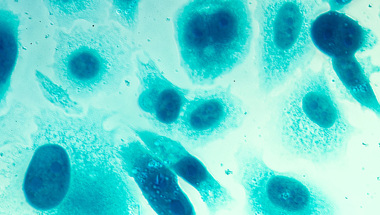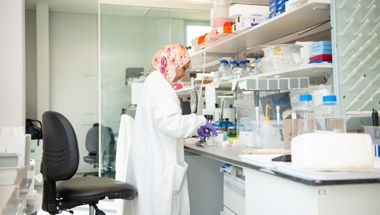
Can we reduce radiotherapy side-effects with fibre supplements?

Grant information
Reference: RIA23-ST2-006
Lead researchers: Professor Anne Kiltie, University of Aberdeen and Professor Ananya Choudhury, The University of Manchester
Award: £661,027
What you need to know
- This study tests whether adding the fibre supplement inulin can reduce side effects, like diarrhoea, during prostate cancer radiotherapy.
- Inulin, found naturally in plants, helps boost gut bacteria that can reduce inflammation in the gut. Inflammation is one way radiotherapy can damage the intestines.
- If successful, this low-cost approach could become a standard part of radiotherapy, improving men’s lives during and after the treatment.
Why are we funding this research?
Radiotherapy is a powerful treatment that targets cancer cells, but it can also affect nearby healthy tissues, leading to issues like diarrhoea, bowel bleeding, and bladder problems. These side effects can have a significant impact on a man's quality of life, both during and after treatment.
What will the researchers do?
This research project, called the DIETRICH study, will investigate whether a fibre supplement called inulin can help reduce the side effects that many men experience. Inulin supports the growth of beneficial bacteria in the gut. These bacteria can help reduce inflammation, which is a major cause of the side effects experienced during radiotherapy.
The main goal is to see if starting inulin before treatment can reduce common problems like diarrhoea and irritation in the bowels and bladder, which often happen when radiotherapy affects these sensitive areas.
Researchers will recruit 220 men who are about to undergo radiotherapy for prostate cancer. These men will be divided into two groups by chance – one group will receive inulin, while the other will receive a dummy supplement that looks the same but has no active ingredients.
The participants will start taking these supplements two weeks before their radiotherapy begins and continue during and for three weeks after their treatment. This enables the researchers to see if starting the inulin early can help prevent side effects, instead of just treating them after they appear.
To monitor the effects of inulin, the researchers will ask the men to fill out regular questionnaires about their bowel and bladder symptoms. They will also collect stool (poo) samples at three different times during the study to analyse the types of bacteria present and the chemicals they produce. This will help the researchers understand how inulin affects the gut and whether the men's usual diets play a role in these changes.
We are delighted to receive funding from Prostate Cancer UK to undertake our phase 2 clinical trial, DIETRICH. This study will test the value of inulin, a dietary fibre supplement with known health benefits, in men undergoing radiotherapy for prostate cancer. We anticipate that this will reduce intestinal and urinary side effects that men can experience from prostate radiotherapy and will allow us to confirm our laboratory findings. If our trial is successful, this will lead to us undertaking a much larger study on the benefits of inulin in men undergoing prostate radiotherapy.
How will this benefit men?
The potential benefits of this research are twofold. First, by finding a way to prevent these side effects using a simple fibre supplement like inulin, men could have a much more comfortable experience during and after their cancer treatment. Second, early studies in animals suggest that inulin might also help make radiotherapy more effective in killing cancer cells, which could improve survival rates and reduce the risk of the cancer coming back.
If this study is successful, it could lead to a major change in how prostate cancer is treated. A larger national trial could confirm these findings, potentially making inulin a routine part of radiotherapy treatment. This would not only improve patients' quality of life but also make the treatment process more cost-effective for healthcare systems, as fewer side effects mean less need for additional treatments and hospital visits.
Help us fund more research like this
Your donation helps us fund lifesaving research into better treatments for prostate cancer.



